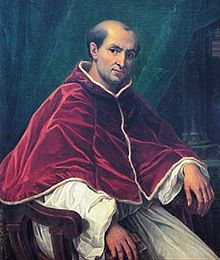Pope Clement V
|
Pope Clement V |
|
|---|---|
 |
|
| Papacy began | 5 June 1305 |
| Papacy ended | 20 April 1314 |
| Predecessor | Benedict XI |
| Successor | John XXII |
| Orders | |
| Consecration | 14 November 1305 |
| Personal details | |
| Birth name | Raymond Bertrand de Got or de Gouth or de Goth |
| Born | about 1264 Villandraut, Gascony, Kingdom of France |
| Died | 20 April 1314 (aged c. 50 years) Roquemaure (Gard), Kingdom of France |
|
Papal styles of Pope Clement V |
|
|---|---|
 |
|
| Reference style | His Holiness |
| Spoken style | Your Holiness |
| Religious style | Holy Father |
Pope Clement V (Latin: Clemens V; c. 1264 – 20 April 1314), born Raymond Bertrand de Got (also occasionally spelled de Guoth and de Goth), was Pope from 5 June 1305 to his death in 1314. He is remembered for suppressing the order of the Knights Templar and allowing the execution of many of its members, and as the Pope who moved the Curia from Rome to Avignon, ushering in the period known as the Avignon Papacy.
Born in Villandraut, Aquitaine, Bertrand was canon and sacristan of the Cathedral of Saint-André in Bordeaux, then vicar-general to his brother, the Archbishop of Lyon, who in 1294 was created Cardinal-Bishop of Albano. He was then made Bishop of St-Bertrand-de-Comminges, the cathedral church of which he was responsible for greatly enlarging and embellishing, and chaplain to Pope Boniface VIII, who made him Archbishop of Bordeaux in 1297.
Following the death of Benedict XI in 1304, there was a year's interregnum occasioned by disputes between the French and Italian cardinals, who were nearly equally balanced in the conclave, which had to be held at Perugia. Bertrand was elected Pope Clement V in June 1305 and consecrated on 14 November. Bertrand was neither Italian nor a cardinal, and his election might have been considered a gesture towards neutrality. The contemporary chronicler Giovanni Villani reports gossip that he had bound himself to King Philip IV of France by a formal agreement before his elevation, made at St. Jean d'Angély in Saintonge. Whether this was true or not, it is likely that the future pope had conditions laid down for him by the conclave of cardinals.
...
Wikipedia
